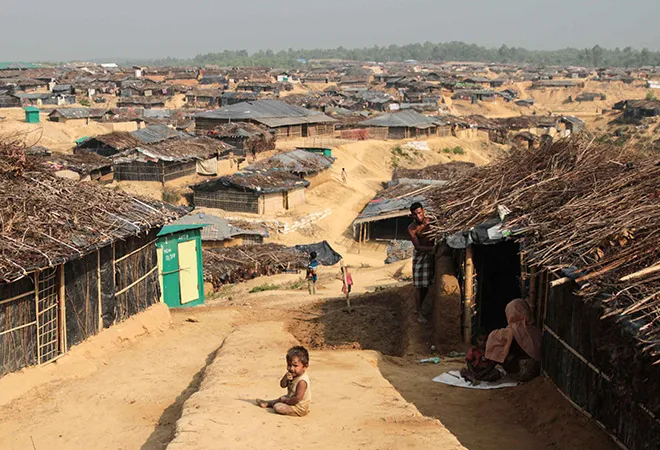-
CENTRES
Progammes & Centres
Location
The UN report may not change India’s official position on Myanmar and New Delhi will continue its constructive engagement with the country

In a significant development concerning Myanmar’s Rohingya Muslims minority in Rakhine, the United Nations has charged Myanmar of “genocidal intent”, the strongest condemnation from the international community so far.
Violence in northern Rakhine displaced several hundred thousand Rohingyas within Myanmar and driven out some 700,000 of them to neighbouring Bangladesh after the military launched a bloody crackdown triggered by militant attacks on security forces in late August 2017.
The UN Human Rights Council (UNHRC)-appointed Independent International Fact-Finding Mission on Myanmar in its report called for the UN Security Council (UNSC) to set up an ad hoc tribunal to try suspects or refer them to the International Criminal Court in the Hague, impose an arms embargo on Myanmar and subject its officials to targeted sanctions and travel bans.
Myanmar has consistently rejected UN reports on human rights violations in Rakhine and it’s likely to do so this time around. In fact, when the UN fact-finding mission issued an interim report in March, Myanmar rejected it and accused its members as “biased” and “one-sided”. Myanmar also refused access and cooperation in the UN investigation.
The question is where would the UN three-member penal report go from here. Much will depend on whether the permanent members of the UNSC want to pursue the allegations. The veto-wielding members have often found themselves divided on Myanmar with China and Russia protecting it from any harsh action.
The report has yet again brought into focus the gravity of the issue before the international community. However, it also raises the question if international pressure on Myanmar would be effective in finding a lasting resolution. The UN mission hinges its recommendations largely on the threat of legal action. In a divided UNSC, such an action looks distant.
On the other hand, the wider societal challenge in Myanmar forms the other side of the problem that needs urgent attention.
Punishing the guilty needs to go hand-in-hand with finding ways in resolving the deep-rooted ethnic and religious animosities in the country. As the international community takes measures to punish the perpetrators of violence, it is equally important to help build social co-existence as a long-term guarantee to avoid renewed conflicts.
In the past, blanket economic sanctions by western countries on Myanmar had little impact in inducing a behavioural change among Myanmar military ruling elites. Last year, the United States re-imposed targeted sanctions on Myanmar, the effectiveness of which remains to be seen. The UN report recommends travel bans and targeted sanctions against Myanmar’s military generals. Such measures may have symbolic significance, particularly if they come from the UN.
The UN report has charged Myanmar’s top military brass of the “gravest crimes” and blamed the country’s de facto leader Aung San Suu Kyi for failing to use her “moral authority” to protect civilians. With the top military and civilian leadership under the scanner, both may work in unison to minimise the impact of the report.
This means the country’s internal politics may not be adversely affected by the report. However, if the calls for Myanmar’s military commander Senior General Min Aung Hlaing to step down emerge as a rallying point in the days to come, it will have repercussions on the internal power dynamics within the armed forces and in ties with political parties.
Delhi has long opposed unilateral actions against Myanmar, although it has supported UN initiatives. India was part of a UNSC delegation that visited Myanmar in May along with three other neighbours — China, Laos, and Thailand.
When the UNHRC passed the resolution extending the mandate of this fact-finding mission on Myanmar in September 2017, India did not openly disassociated itself from the resolution, even as it argued for “constructive engagement” as a preferred approach to protect and promote human rights.
The UN report may not change India’s official position on Myanmar and Delhi would continue its constructive engagement with the country. Even so, given the magnitude of the allegations made by the UN report, external pressures on India in its bilateral dealings with Myanmar and when the issue comes up in UN bodies cannot be ruled out.
This commentary originally appeared in Money Control.
The views expressed above belong to the author(s). ORF research and analyses now available on Telegram! Click here to access our curated content — blogs, longforms and interviews.

K. Yhome was Senior Fellow with ORFs Neighbourhood Regional Studies Initiative. His research interests include Indias regional diplomacy regional and sub-regionalism in South and Southeast ...
Read More +